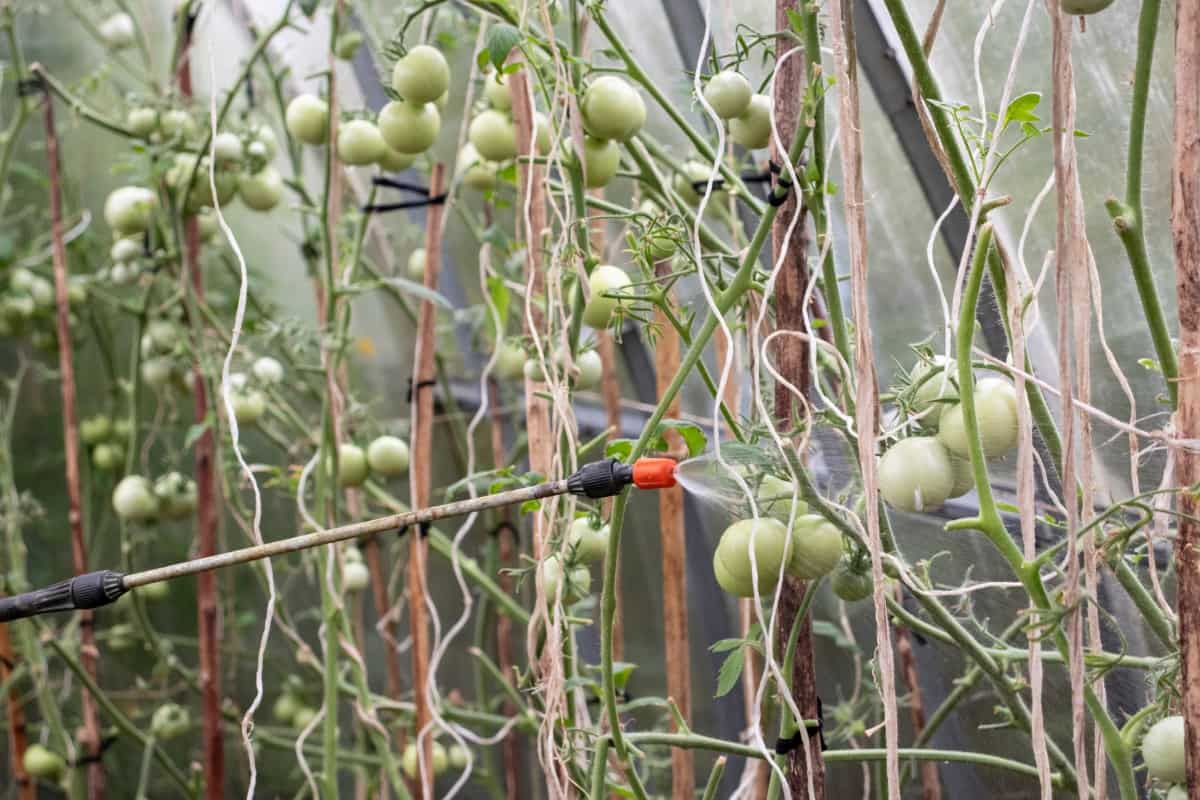Tomato plants, a staple in gardens worldwide, often face the challenge of leaf miner infestations. This article explores various methods to manage and eliminate these pests, ranging from natural remedies to chemical solutions.

How to Control Leaf Miner in Tomato
Causes and Symptoms of Leaf Miners in Tomato Plants
Leaf miner damage in tomatoes is a common issue that gardeners face. These pests tunnel through the leaves, leaving visible trails and stunting plant growth. Identifying a tomato leaf miner is crucial; they are small larvae that burrow into the leaves, causing the leaf tissue to discolor and wilt.
The symptoms of leaf-mining on tomato plants include squiggly lines on the leaves, discoloration, and, in severe cases, leaf drops. The causes of leaf miner damage in tomatoes are typically due to the larvae of various insects, including flies, moths, and beetles. Detecting and treating this pest promptly is essential for effective management.
Use Natural Ways to Control Leaf Miners in Tomato Plants
Several strategies can be employed to prevent leaf miners from naturally damaging tomato plants. Natural methods include introducing beneficial insects, like ladybugs and parasitic wasps, that prey on leaf miners. Using physical barriers like floating row covers can also prove to be effective in preventing adult insects from depositing their eggs on the plants. Regular monitoring of the plants to remove and destroy infected leaves can help reduce the population of leaf miners. Additionally, practicing crop rotation and maintaining healthy soil can also deter leaf miners.
Manage Leaf Miner Infestation in Tomatoes with Organic Methods
Organic methods to manage leaf miner infestation in tomatoes are both effective and environmentally friendly. Neem oil for leaf miners on tomato plants is a popular choice. It acts as a repellent and also disrupts the life cycle of the pests. Using neem oil as a foliar spray can greatly decrease leaf miner infestations. Other organic solutions include using insecticidal soaps and horticultural oils, which can smother the larvae without harming beneficial insects or the environment. Keeping the garden clean and free from debris can also discourage leaf miners.
Control Leaf Miners in Tomato Plants Using Chemicals
For those seeking a more aggressive approach, chemical control of leaf miners in tomatoes is an option. The best pesticide for leaf miners and the best systemic insecticide for leaf miners are available in garden centers and nurseries. These chemicals, such as leaf miner control insecticides, target the larvae within the leaves. However, it’s crucial to follow the manufacturer’s instructions for application and safety. Using chemical pesticides should be a last resort, as they can also harm beneficial insects and disrupt the ecosystem.
Make Your Homemade Spray for Leaf Miners on Tomatoes
Homemade sprays can be effective in getting rid of leaf miners in tomatoes at home. A popular homemade solution involves mixing water with a small amount of dish soap; will dish soap kill leaf miners? Yes, it can suffocate the larvae when applied directly. Another homemade recipe includes a blend of garlic and water or a mixture of neem oil and water. Apply these sprays directly to the plant’s affected areas, preferably during the early morning or late evening, to prevent harm to beneficial insects.
In case you missed it: 9 Best Homemade Remedies for Leaf Miners in the Garden: Get Rid of Them with Simple Recipes

Find Effective Natural Remedies for Leaf Miners in Tomato Plants
Natural remedies for leaf miners are numerous and can be highly effective. The best treatment for leaf miners often involves a combination of methods. Regular inspection of plants and removing affected leaves can significantly reduce leaf-miner populations. Introducing natural predators, using neem oil, and applying homemade sprays are all part of an integrated pest management approach that can keep leaf miner problems in check without resorting to harsh chemicals.
Use Organic Insecticides to Control Leaf Miners in Tomatoes
Organic insecticides are a safe and effective way to control leaf miners in tomatoes. Products containing spinosad, a natural substance made by soil bacteria, can be particularly effective against leaf miners. When using organic insecticides, it’s important to apply them correctly and at the right time for the best results. These products are less harmful to beneficial insects and the environment, making them a preferable choice for organic gardening and sustainable agriculture practices.
Manage Leaf Miner Issues in Tomato Plants with Chemical Pesticides
Controlling leaf miners in tomatoes sometimes necessitates the use of chemical pesticides. These pesticides, specifically designed for leaf miner control insecticide, are effective in targeting and eliminating the larvae. When using chemical methods, it’s essential to select the best pesticide for leaf miners, ensuring it’s suitable for use on tomato plants.
In case you missed it: How to Get Rid of Leaf Miners on Citrus Trees: Naturally, Organically, and Chemically

The application of these chemicals should be done with care, following the instructions on the label to avoid harming non-target organisms and the environment. Regular monitoring after treatment is crucial to assess the effectiveness and determine if reapplication is needed. It’s also recommended to alternate between different types of pesticides to prevent resistance development in leaf miners.
Create a Diy Spray for Leaf Miners in Organic Tomato Farming
In organic tomato farming, creating a DIY spray for leaf miners is a practical and safe method to protect your plants. A popular homemade solution involves a mixture of water and mild soap, which can deter and kill leaf miners when sprayed directly onto the leaves. Another effective spray can be made using neem oil mixed with water.
This natural oil acts as an insecticide without harming beneficial insects or the surrounding environment. Applying these homemade sprays regularly, especially after rain or watering, can significantly reduce leaf-miner infestation while keeping the organic integrity of the tomato plants.
Prevent Leaf Miner Damage in Tomato Plants Naturally
Preventing leaf miner damage in tomato plants naturally involves several non-chemical strategies. Firstly, maintaining healthy plants through proper nutrition and watering can make them less susceptible to pest attacks. Using physical barriers like floating row covers can prevent adult leaf miners from laying eggs on the plants.
Promoting the presence of natural predators like ladybugs and lacewings in your garden can effectively manage leaf-miner populations. Regularly inspecting plants and removing affected leaves or using traps can also effectively reduce leaf miner damage. These methods contribute to a sustainable and eco-friendly approach to gardening.
Eliminate Leaf Miners From Tomato Plants Using Safe and Natural Methods
To eliminate leaf miners from tomato plants using safe and natural methods, consider an integrated approach. Introducing beneficial insects that prey on leaf miners, such as parasitic wasps, can provide long-term control. Applying natural repellents like neem oil can disrupt the life cycle of leaf miners.
In case you missed it: Benefits of Mineral Fertilizer Sticks: How to Use for Indoor Potted Houseplants

Regularly inspecting plants and promptly removing infested leaves can prevent the spread of leaf miners. Additionally, practicing crop rotation and maintaining soil health can deter leaf miners. These methods are not only effective in controlling leaf miners but also contribute to the overall health and sustainability of the garden ecosystem.
Conclusion
Effectively managing leaf miners in tomato plants is crucial for healthy crop production. Whether through chemical, organic, or homemade methods, the key is to choose the right strategy for your garden’s specific needs and maintain consistent care for the best results.
- Feed Your Flock for Less: Top 10 Tips to Save on Chicken Feed
- Ultimate Guide to Ossabaw Island Hog: Breeding, Raising, Diet, and Care
- Hatching Answers: The Top 10 Reasons Your Chickens Aren’t Laying Eggs
- Eggs and Economics: Breaking Down the Cost of Raising Backyard Chickens
- Defend Your Greens: Proven Methods to Keep Iguanas Out of Your Garden
- Ultimate Guide to Cinnamon Queen Chicken: A Comprehensive Guide for Beginners
- Ultimate Guide to California Tan Chicken: Breeding, Raising, Diet, Egg-Production and Care
- Ultimate Guide to Marsh Daisy Chicken: Breeding, Raising, Diet, and Care
- 10 Types of Chicken Farming Businesses You Can Start for Profits